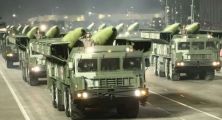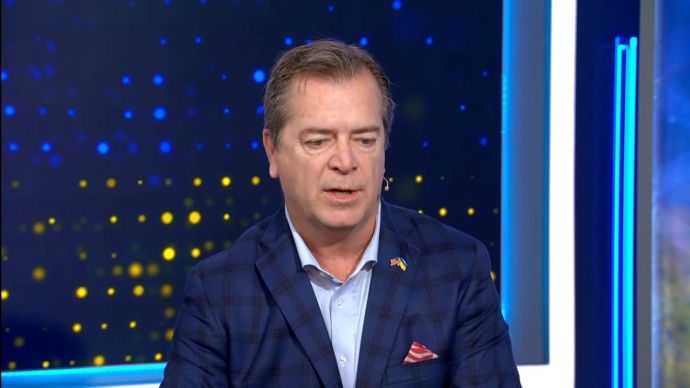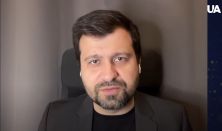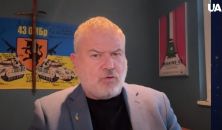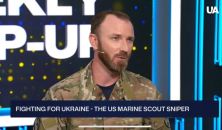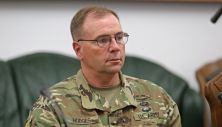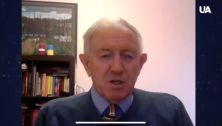Daniel Rice, President of American University Kyiv, ex-Zaluzhny’s advisor in our studio.
What American University Kyiv (AUK) is educating young Ukranians in, what ex-Zaluzhny’s advisor thinks of the Kursk operation? Is Ukraine’s right to hit long-range targets within Russia is legit.
— When a country is in the middle of an existential war, it becomes a sign of hope?
— Absolutely, absolutely. Our motto is “education that gives freedom,” and we want to be part of that hope, building the future leaders who will rebuild Ukraine and take it to greatness. We brought the American style of education here. We founded the university on February 3, 2022—a date that everyone remembers. We could have closed down, but we decided to keep it open.
We started our first year online due to blackouts and air raids, but in May 2023, we opened the doors to the university. Now, we have 500 students enrolled in bachelor’s and master’s programs in IT and business. We’re proud to be ranked number three in Ukraine, according to NMT scores, out of 106 universities. But we’re not satisfied—we will be number one next year.
— All your programs are in English, right?
— Yes, we are the only 100% English-speaking university in Ukraine. All our faculty have been trained in America. Many are originally from Eastern Europe, but everyone has an American education and teaches in an interactive, Socratic way. Our students are our clients, and we treat them with the service mentality you’d expect in an American business.
— You’ve already answered what I was about to ask: what makes American education special? Why is it better than European education?
— The demand for American education speaks for itself. Many international students travel to the U.S. to get that degree.
What we’re doing here is offering the same education at a much more affordable price. Instead of paying $100,000–$200,000 in the U.S., students can study here for $20,000 for a four-year degree. They can even get a dual degree from Arizona State University.
They’re receiving the same education as they would in Arizona for a fraction of the price, and they want to stay in Ukraine during these tough times.
— I know you’re ex-military. Once a soldier, always a soldier, right?
—Soldier for life, yes. I attended West Point, graduated in 1988, and trained to fight the Russians. Many of the weapons being used now in Ukraine were from the ’80s and ’90s, and I was trained on those. I served as an artillery officer, worked with multiple launch rocket systems (now called HIMARS), and then, after 9/11, rejoined the Army to serve in Iraq as an infantry officer.
After my time in Iraq, I left the military but came to Ukraine voluntarily in May 2022 to advise General Zaluzhny, helping with lobbying efforts for weapon systems.
— Thank you for your service!
— It was my honor. I volunteered on my own dime and continue to lobby for Ukraine.
America has provided great support, but until victory, it’s never enough.
I wish we had delivered certain weapon systems earlier—like HIMARS, cluster munitions, and F-16s. We can learn from that.
We also need to remove restrictions on Western weapons and allow Ukraine to use them against Russian staging areas.
— What do you think about the Kursk operation?
— The Kursk operation was bold and risky but brilliantly executed. It surprised not only the Russians but also the West. It broke the frozen front lines of 2023 and opened up new possibilities for Ukraine.
Risks always come with such operations—extended supply lines, resource pulling from other areas—but Ukraine handled it well. Now, Ukraine has leverage for negotiations if needed, and I think there may be more surprises to come.
In 2023, Ukrainian forces were under pressure to enter minefields, which cost a lot of lives and didn’t yield much ground. The Kursk operation avoided that and allowed Ukraine to maneuver quickly behind Russian lines. Ukraine’s forces are learning fire and maneuver tactics, and they’re doing an incredible job.
— I think it’s hypocritical to give someone weapons to defend their country but restrict their use. Do you agree?
— Absolutely. It’s a dysfunctional system, especially with 32 NATO countries, each with its own approval processes.
It’s like giving Churchill weapons but telling him he can only use them within the UK to fight the Nazis.
Restrictions need to be removed. Ukraine has shown it can achieve miracles with limited resources, and the West needs to fully support Ukraine to recover its 1991 borders.
— You mentioned changes in U.S. politics—what’s your view on Biden’s stance?
— I think Biden pulling out of the next election changed things. This war is his legacy, and since July 2023, there’s been a shift—restrictions are loosening, and more weapons are flowing to Ukraine. By the time he leaves office in January, we’ll see even more, and that will continue even under a new president.
— Would you allow strikes on Russian territory?
— 100%, yes. I’d go further—give Ukraine Tomahawk missiles with a 1,500-mile range. Russia started this war by invading a sovereign country and breaking post-WWII norms.
Escalation fears are misplaced because Russia has already escalated by its actions.
— Why isn’t this obvious to the U.S. government?
— We need shows like this to spread the message. We need to continuously remind everyone that Russia is the enemy. You can’t negotiate with Russia—they never comply. That’s why I’ve been advocating in Washington, meeting with the Senate, the House, and the Pentagon to push these messages.
Leaders like Kaja Kallas of Estonia are great at rallying support, and we’ve seen NATO grow stronger as a result of Russia’s aggression.
